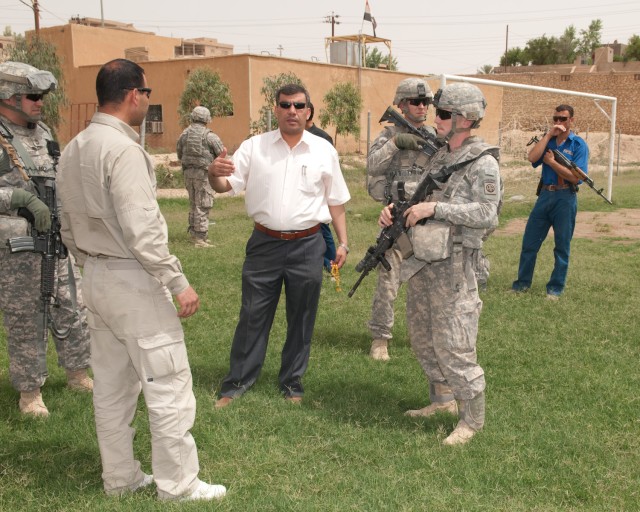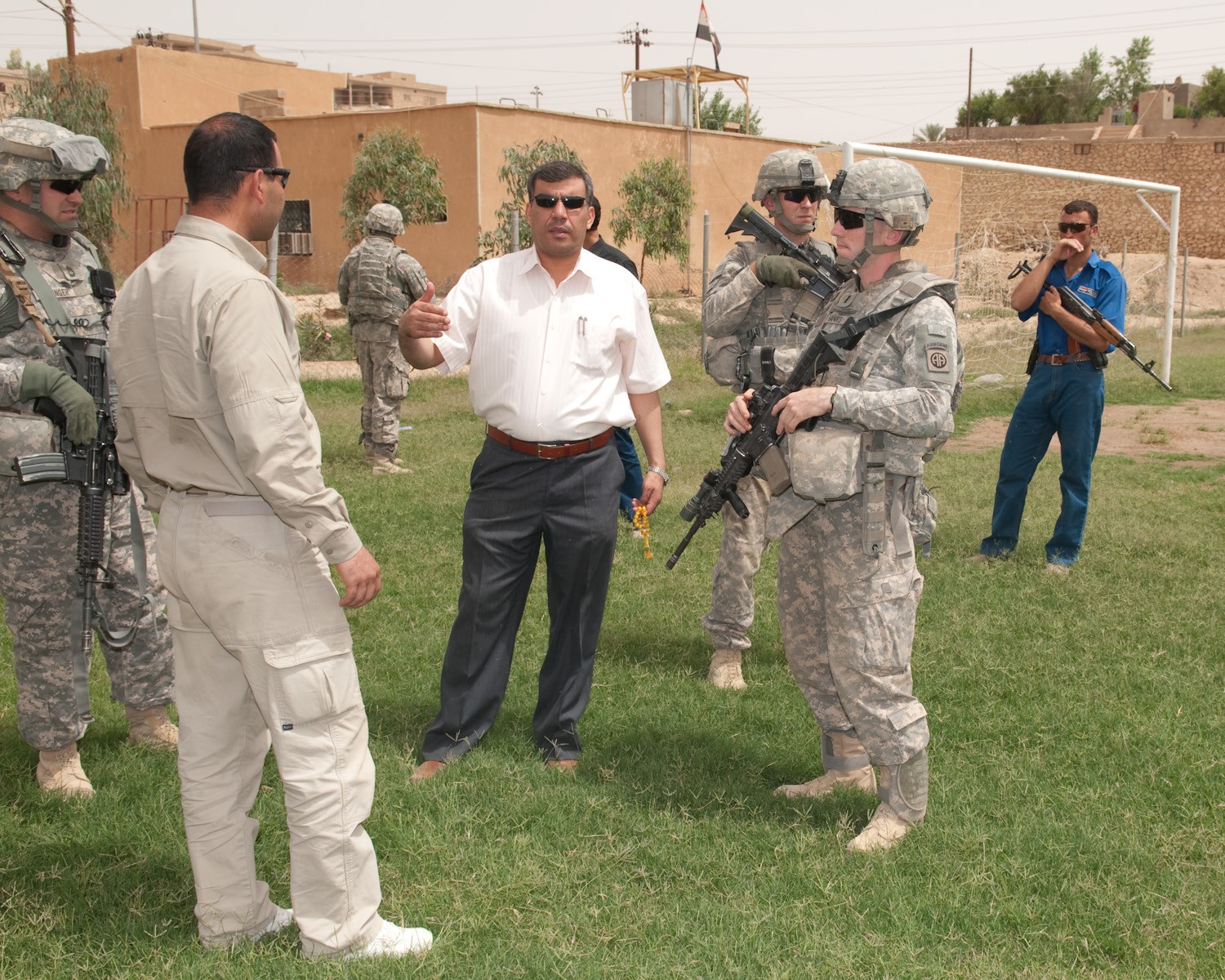
AL ASAD AIR BASE, Iraq (Army News Service, May 19, 2010) -- The mayor of an Iraqi town once completely controlled by the insurgency invited a platoon of paratroopers to tour his peaceful city with him May 13.
Mayor Myeser Abdol Mohsin Freh hosted Battery B, 3rd Battalion, 319th Airborne Field Artillery Regiment, 1st Advise and Assist Brigade, 82nd Airborne Division, on a tour of Barwana, a small town on the eastern shore of the Euphrates River across from larger Haditha in Iraq's desert Al Anbar province.
"I am proud of my city," Myeser told 1st Lt. Samuel Banks, leader of 2nd platoon. "The best part of our story is how the U.S. forces helped the dream of freedom come true for Barwana."
The group visited the town's new soccer stadium, a water project that provides potable water for half of Barwana's 20,000 residents, and the site of a planned youth recreational facility.
"The insurgents blew up the old police station here," the mayor explained to the group, who had gathered in a walled-in acre of land on the town's main street. "Instead of rebuilding it, we are going to make this area a place where everyone can enjoy themselves."
On a Thursday afternoon, the streets were crowded with people preparing for Friday, the beginning of the Iraqi weekend. Young boys at one of two bridges connecting Barwana to Haditha dove and flipped off pontoons, amusing the Soldiers. They tried to coax the Americans into the water.
"It is very safe now in Barwana," said Adnan, an employer who works for the government. "My children can go to school and move about town freely. The mayor has done a very good job, and we feel safe because we see the police about."
Abdol Salam Madalla, a 34-year-old handyman and father of five who was born in Barwana, said it has been more than a year since he has worried about the safety of his family.
"We never recognized a difference between al-Qaeda and the insurgents. We just knew they were all bad. But they are gone now," he said.
Abdul said he recognized most of the Iraqi policemen in Barwana as neighbors.
"Last time I saw an American soldier was about a year ago," he said. "Normally, when we see U.S. forces, we feel a little fear, but we feel safe at the same time."
Though the paratroopers of 3-319th have partnered with local Iraqi Security Forces since 2009 (principally the 27th Brigade, 7th Division), requiring an Iraqi escort to enter the city reduces their exposure to the townspeople.
"Before I got here, Bravo Battery had already established a relationship with the leadership of their city council, mayor and police," said Banks. The paratroopers delivered 200 humanitarian aid packages twice this year, he said.
"We are partners to boost their security, and we give them some materiel support, but not much," he said. "To be honest, they do not ask for much. They are pretty independent."
Though the trip to Barwana was his first, Spc. Travis Benefiel, a former Marine now serving with the Army, remembers a very different Haditha of just a few years earlier.
"We had constant [improvised explosive devices], small-arms fire, mortar fire and rocket fire," said Benefiel. "It was very dangerous -- lots of suicide bombers and vehicle-borne IEDs. I lost quite a few friends."
According to the mayor, following the invasion, Barwana was under the control of coalition forces, though the main effort was protecting Haditha Dam upstream.
Insurgent groups began filtering into town after 2004 and immediately threatened local security forces. Mayor Achmed Mohatna quit, and the other city leaders fled to Baghdad.
The town fell under the control of the so-called Islamic State of Iraq and a new government containing al-Qaeda and insurgents.
"They used to do just one thing in the city," said Myeser. "Killing."
Insurgents controlled everything in the city, stopping inbound delivery trucks and stealing their goods. They killed anyone they wanted to and left the bodies in the streets for people to see. They killed on suspicion, even for saying a single word, said Myeser.
"If they knew of anyone working with the government, police or military, they would slaughter him, cut off his head and send his head to his family," he said.
In 2007, the Americans and Iraqi Security Forces entered Barwana and cut off all travel to and from the city at the two bridges and the few roads leading across the desert.
"It was very hard to get through the checkpoints," said Myeser. "For a while, the civilians suffered. We didn't have a hospital for major operations. If people wanted to leave the city, they had two choices: take a boat or drive 200 kilometers by truck around the checkpoints."
In 24 hours, most of the insurgent groups left the city, said Myeser.
According to Barwana Police Chief Maj. Mohammad, U.S. forces stayed inside the city for two years. In February 2007, the town reconstituted a police force. Within six months, policemen were walking the streets without helmet or body armor.
"We worked together with the U.S. and fought the insurgents relentlessly," said Mohammad. "Now there is no insurgency left inside the city. If the insurgency tries to reactivate, we will discover them and detain them."
In 2007, Myeser returned from Baghdad, where he had been practicing law since 2001. With other town leaders, he formed a local government. Their immediate focus was to provide residents with clean water, healthcare and power.
They asked the central and provincial governments for aid, and even traveled to Ramadi to petition important tribal sheikhs, but nobody offered to help.
"Nobody except the U.S. Army and Marines," said Myeser. "They were our brothers and they supported us until the city stood up."
U.S. military civil affairs funded three water and three power projects, supplied materials and devices to medical clinics, rebuilt a number of schools and provided books and other learning materials, rebuilt the municipal building, supplied city dumpsters, refurbished the roads and provided unlimited support to local IP, he said.
Additionally, U.S. Special Forces funded nine projects, including a soccer field, a clinic, computers for the schools, two electric projects, and a water project. They also conducted many operations with the police.
It wasn't long before the townspeople realized that partnered U.S. military and Iraqi Security Forces had more to offer than the insurgent groups. U.S. forces supplied the power, IPs supplied the human intelligence, and the remaining insurgent elements were rooted from the town.
There is little doubt that the island-like nature of Barwana - surrounded by desert and only accessible to the network of roads on the west bank of the Euphrates by two bridges - made the job of cherry-picking insurgents from the population much easier than it might have been in a town with a more porous border, said Banks' battery commander, Capt. Max Caylor. Still, he said, the leaders of Barwana did many things right, and so did U.S. forces.
When police and municipal workers were not getting paid, U.S. forces petitioned the provincial government in Ramadi until the issue was remedied. Homeowners were compensated by U.S. forces for damage to their property that occurred during the pursuit of insurgents.
"Just about everybody has been paid by now," said Myeser.
The last U.S. Soldier left Barwana July 13, 2007, he said.
"Though they handed over security to the local government and police, we have continued our relationship with U.S. forces.
"I want the families of fallen [U.S.] Soldiers to know that I never felt like they invaded Barwana. I saw them as brothers bringing freedom to Barwana. Without their working side-by-side with us, we would not be successful. In time, everybody left us, but they stayed by our side," said the mayor.
Were it his decision, Myeser would extend the U.S. presence in Iraq four more years until loyalties of Iraqis and especially their security forces align more with the country and less with political parties, he said.
Sgt. 1st Class Jason Reininger, a platoon sergeant, knows what it's like to spend four years in Iraq. On his seventh deployment with the Army and fourth to Iraq, the visit to Barwana helped him feel that the buddies he lost in combat here in Iraq did not die in vain.
"Today I saw a community doing things for themselves, accepting U.S. support, and doing great things with it," said Reininger. "I saw a soccer stadium -- grass, sprinkler systems -- funds that were put to good use. And a water treatment plant that was new and working."
Reininger said his fallen comrades would be proud of how the people of Barwana were honoring the sacrifices they and their families had paid and continue to pay for Iraqi freedom.
"If people want to know what we're doing over here, they should look at this community," he said. "I would hope that other communities around Iraq would look at what they're doing to make themselves better."
(Sgt. Michael J. MacLeod writes for 1/82 AAB, USD-C)

Social Sharing